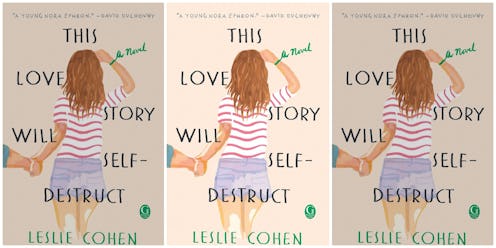Books
This New Novel Helped Me Understand Why It's So Difficult To Return To Home Sometimes

When I picked up Leslie Cohen's debut novel This Love Story Will Self-Destruct, out Jan. 23, I was having one of those weeks where it seemed impossible that I had gotten so old. I had recently moved back to my hometown, Austin, after a three-year stint in New York City, and upon my return, I realized just how many things had changed. I found that some of my favorite restaurants and stores — places that were the foundation for my childhood and college years — were now empty or shut down or replaced by chain stores. My favorite mural had been painted over by an ugly advertisement for sneakers.
That first week back, as I sat in my childhood bed and read Cohen's book, I found myself utterly struck by one line — a question posed by the main character, Eve:
"Does an apartment still exist once you no longer live there? Why does a restaurant continue to operate once you’ve paid the bill and walked away, the door swishing closed in your wake?"
The answers to these questions are obvious. "Does an apartment still exist once you no longer live there?" Yes, of course, in most cases. "Why does a restaurant continue to operate?" Because no restaurant could logically shut down after serving a single customer. But really, what Eve is expressing is a universal, selfish urge: The foundations of our lives must belong only to us, even as we grow and move on.
This Love Story Will Self Destruct by Leslie Cohen, $11, Amazon
I suppose, in my case, the literal restaurant had not continued to operate, but my city had kept churning without me nonetheless. It felt wholly unfair. There had always been a part of me that thought I could return to Austin and find everything exactly the same as it had always been. When I returned, I had to confront something that, while entirely predictable, was still shocking and sad: I was not the same person as I had been when I left, and my city was not the same either.
This theme is prevalent in This Love Story Will Self-Destruct. While this book says it's as a love story, the romantic storyline takes a backseat to Eve's personal journey from adolescence to her thirties. As everything changes around Eve, she must come to grips with adulthood and discover what she wants out of her life.
Not only does Cohen nail those little moments when you realize how much your life is changing and has changed, but she beautifully describes how it feels to exist at all these seemingly disparate stages of your life. As I read, I found myself highlighting sentence after sentence that I felt perfectly encapsulated some tiny truth of my own life, such as this description of Eve in her college years:
"In college, I was this walking, talking well of feelings. All you had to do was press gently, and there was a tenderness inside of me, a prickly feeling. Just press slightly, and everything would come spilling out uncontrollably."
Eve is fascinated by the girl she used to be, and I, the reader, was too. But perhaps more selfishly, I was fascinated by the girl I used to be. Once that girl had existed in this same skin, and now she was gone. Replaced. A new person, like a new restaurant or a new store or a new mural.
This Love Story Will Self Destruct is a love story in one important respect: It's a book about the journey, not the destination. It's about the changes within. It's about a woman finding the courage and strength she needs to become who she is meant to be. While reading it, I found that maybe I could find the courage to accept my past — the parts that are gone and the parts that remain — and forge ahead on my new path.
This Love Story Will Self Destruct by Leslie Cohen, $11, Amazon